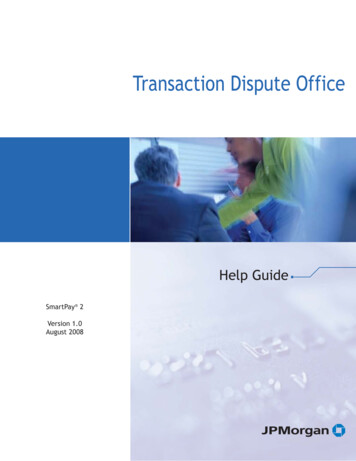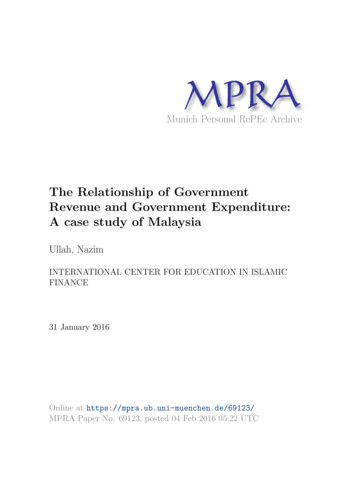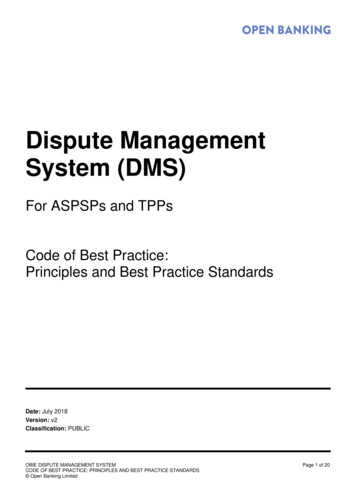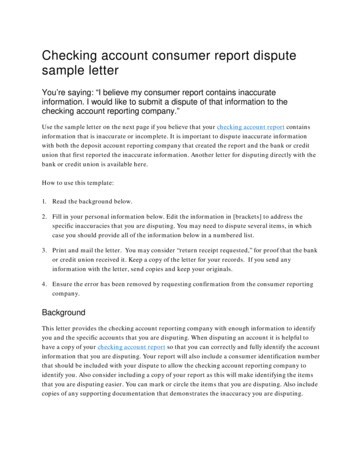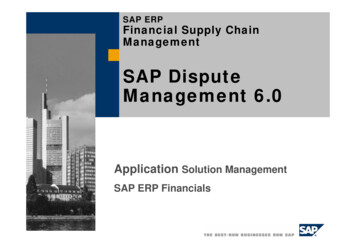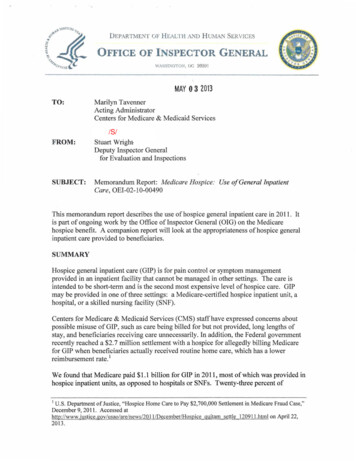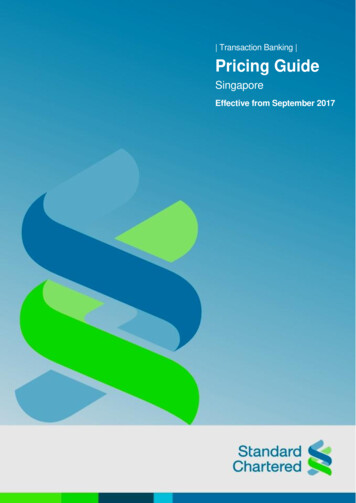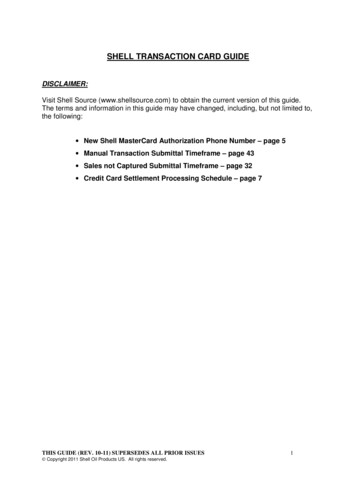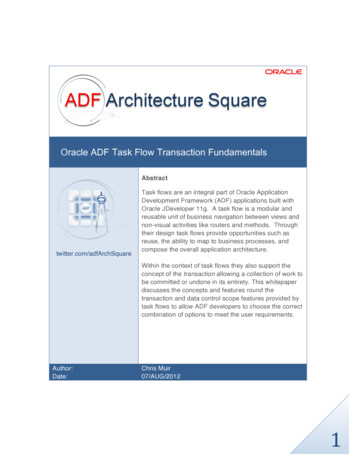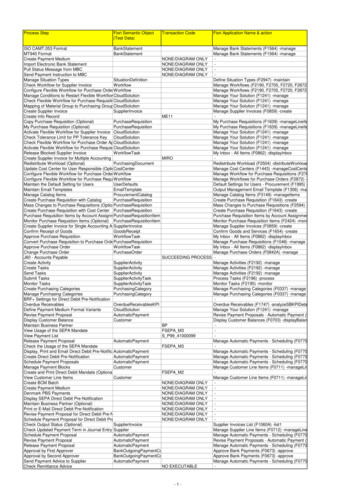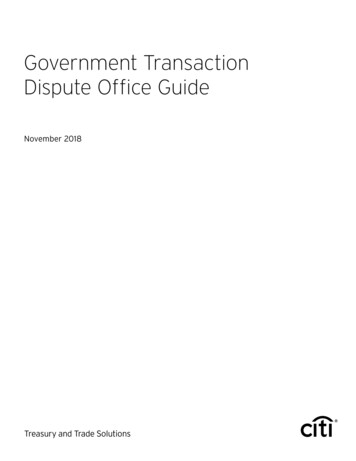
Transcription
Government TransactionDispute Offce GuideNovember 2018Treasury and Trade Solutions
Government Transaction Dispute Offce Guide Table of ContentsTable of ContentsI.General Overview.2II.Responsibilities of Program Participants.2III. Unique International Use Procedures .4IV. Disputes. 4V.Chargeback Provisions. 6VI. Dispute Resolution Process.6VII. Electronic Access System (EAS) .7VIII. Reports .9IX. Customer Assistance .9X.Appendix A .111
Government Transaction Dispute Offce Guide General OverviewGeneral OverviewThis manual provides general guidelines to assist Agencies/Organizations in managing theirTransaction Dispute Process for Purchase, Travel, Fleet and Integrated programs under the GSASmartPay program by Citibank . These programs are designed to meet the following objectives: Reduce paperwork associated with administrative costs for the Purchase, Fleet, Integrated andCentrally/Individually Billed Travel Card programs Streamline procedures associated with management practices regarding the purchase of goodsand services, offcial Government travel and travel-related expenditures, and feet servicesprovided to the Agency/Organization Provide procedural controls and feedback to improve management control and decision makingregarding the GSA SmartPay Government Purchase, Fleet, Integrated and Travel Card programsResponsibilities of Program ParticipantsTransaction Dispute Offce (TDO)A TDO may be established to assist an Agency/Organization and Citibank in tracking and resolvingdisputed transactions associated with the GSA SmartPay Government Purchase, Fleet, Integratedand Travel Card programs.The TDO normally serves as the conduit among Citibank, the Designated Billing Offce (DBO)and the Agency/Organization Program Coordinator (A/OPC) to resolve disputed transactions inPurchase, Fleet, Integrated and Travel Card programs. The TDO oversees the proper processing oftransaction disputes and works with Citibank to resolve them.The TDO is typically responsible for the following: Ensuring changes within the TDO are provided to the A/OPC in a timely fashionEnsuring disputed transactions are reported to Citibank in a timely mannerTracking Purchase, Fleet, Integrated and Centrally Billed Travel Card transaction disputesProviding feedback to A/OPC on efforts and performance of Citibank in resolving disputesAnalyzing and monitoring Citibank reports detailing transaction dispute activityConducting site visits to Citibank as requiredParticipating in annual training conferences and disseminating basic information gatheredduring the conference proceedingsFor specifc responsibilities, please see Attachment 6 of the GSA SmartPay Master Contract.Agency/Organization Program Coordinator (A/OPC)The A/OPC is an individual designated by the Agency/Organization to perform task ordercontract administration within the limits of delegated authority and to manage the card program.The A/OPC generally serves as the focal point for answering questions, completing contractadministration activities, coordinating applications, issuing and destroying cards, establishing andreviewing reports, managing administrative training and serving as the overall point of contact forCardholders, the Agency/Organization, Citibank and GSA. The A/OPC is a resource for the DBO inthe performance of its payment-related functions.For specifc responsibilities as related to the TDO, please see Attachment 6 of the GSA SmartPayMaster Contract.2
Government Transaction Dispute Offce Guide Responsibilities of Program ParticipantsThe Approving Offcial (AO) (Optional)The Approving Offcial (AO), if used by an Agency/Organization, is normally the supervisor to whoma Cardholder reports for authorization to purchase required supplies and services. AOs assist in thereconciliation of Cardholder accounts, ensuring proper procedures are followed when purchasingsupplies or services. AOs are the conduit between the A/OPC and the Cardholder, ensuring properdissemination of information regarding program changes and Cardholders’ ability to utilize theircards. Although not contemplated by the GSA SmartPay Master Contract, Citibank understandsthat some Agencies/Organizations wish to employ this management tool for their Purchase Cardprogram. Citibank will work with each Agency/Organization that requests such support.For specifc responsibilities as related to the TDO, please see Attachment 6 of the GSA SmartPayMaster Contract.CardholderCardholders and/or AOs, as appropriate, are responsible for fully reconciling each Statement ofAccount or invoice they receive in order to ensure timely identifcation of possible disputes. TheCardholder should retain all receipts and other transaction documentation to facilitate reconciliationin accordance with Agency/Organization policy. If documentation is not available, the Cardholdershould annotate the Statement of Account or invoice, recording all pertinent information.The Cardholder and AO should review and ensure that all transactions on the Statement ofAccount or invoice are appropriate. If an item has been returned and a credit voucher wasreceived, the Cardholder verifes that the credit is refected on the Statement of Account. Ifcredits do not appear in a timely fashion (within 45 days), or if there are any other inconsistencieswithin the Statement of Account or invoice, the Cardholder should initiate the dispute process. Itis the Agency/Organization’s responsibility to ensure that the resolution of all disputes is properlytracked and refected on the Statement of Account or invoice.CitibankCitibank will provide timely delivery of all products and services specifed in the Agency/Organization Task Order within the parameters established under the GSA SmartPayMaster Contract.In the event of a transaction dispute, Citibank shall: Provide suffcient transaction data to identify the charge Promptly investigate disputed items and use best efforts to resolve transaction disputesincluding working with the merchant network(s) and the TDO Provide a copy of the charge in dispute, if requested, however the merchant/merchant bankmay not be required to provide a copy Provide a copy of all Citibank correspondence regarding disputed items, if requested Chargeback the merchant where appropriate Detail the disputed charge on the Invoice Status Report Re-bill proper charges in the subsequent billing period and include complete transaction datafor the re-billed charge, if availableIf a disputed item is resolved before the payment due date, the resolution shall appear on theAgency/Organization’s following offcial invoice.3
Government Transaction Dispute Offce Guide Responsibilities of Program ParticipantsCitibank will provide the Agency/Organization and its employees with dedicated and responsivecustomer service representatives 24 hours a day, 7 days a week, every day of the year throughthe Citibank Customer Service Center at 1-800-790-7206 in the U.S. If outside the U.S., call directat 1-904-954-7850. This service will enable all program participants to obtain information andresolve problems associated with their Government Card programs.Unique International Use ProceduresProcedures for international use conform to those set by the bankcard associations (Visa orMasterCard). Charges in a foreign country will be posted and shown on your invoice in U.S. dollars.The Bank will pass along all charges assessed by the bankcard associations. The total foreigncurrency transaction charges will either be added to, and integrated with, the applicable currencyconversion rate or added to, and integrated with, the posted transaction amount as specifed bythe agency Task Order.DisputesThere are many reasons why a Cardholder may disagree with a charge that appears on his/herStatement of Account. Disputes on sales tax or shipping and handling charges are not a validMasterCard or Visa chargeback reason. Cardholders must resolve these types of disputesdirectly with the merchant by requesting a credit to the account. To avoid this type of merchantcontact, it is very important for the Cardholders to verify the transaction total with the merchantat the time of the transaction. Examples of typical disputes which can be expected to arise underthis contract, and how they should be handled by the Cardholder, are: Unauthorized mail or telephone orders: A high percentage of Purchase Card transactionsare conducted without the card or the Cardholder being present at the merchant location.It is imperative that proper Cardholder procedures be in place which will promote completereconciliation of each billed transaction with Cardholder receipts and/or phone order logs. If theCardholder discovers that he/she has been billed by a merchant for goods or services he/shedid not order, he/she may fle a dispute as an unauthorized transaction and complete a securityclose on the account while fling the dispute as fraud to seek a reversal of the transaction. Duplicate processing: Inadvertently, a merchant may process multiple billings for a singletransaction. This would become apparent to the Cardholder through the reconciliation process ofhis/her billing statement. The Cardholder needs to simply identify when the original transaction wasbilled. If any other circumstances were involved, the Cardholder should provide a brief explanation. Merchandise or services not received: If a Cardholder has been charged by a merchant forsomething he/she has not received, he/she must frst contact the merchant to resolve thesituation. Contact with the merchant may identify that the merchandise is in transit or waslost in transit; a service appointment was not kept; or some other type of obstacle that themerchant was unaware of has occurred. The Cardholder and merchant should come to anagreement regarding a resolution. If the Cardholder and the merchant cannot arrive at asatisfactory resolution, the Cardholder should fle a dispute stating the details of the attempt torectify the situation directly with the merchant. Canceled or returned merchandise: In some instances, a Cardholder may cancel a merchandiseorder or may receive the goods from a merchant and return them even before billing hasoccurred. If returned in person, the Cardholder would have received a credit voucher from themerchant to validate the return. If the goods were returned via mail service or delivery service,the only proof the Cardholder has of the return is the shipping receipt, such as a postal or UPSreceipt or trucking company shipping document. If the order was canceled, the Cardholdershould have a record of the date and time of cancellation, along with a cancellation number,4
Government Transaction Dispute Offce Guide Disputesif applicable. This documentation, identifying the destination of the returned goods, willsubstantiate the return and a copy should be included when a dispute is fled.Credit not received: When a Cardholder receives a credit voucher from a merchant, he/she must reconcile this transaction to his/her billing statement along with his/her chargetransactions to ensure that he/she is actually credited for the return. If the Cardholder has acredit voucher but does not see the credit appear on a subsequent statement, he/she shouldfle a dispute including a copy of the credit voucher.Difference in amount: Part of the Cardholder reconciliation process should include the verifcationof amount to ensure the amount charged to the account is the amount agreed upon anddocumented on the original charge slip. If these differ, the Cardholder should fle a dispute for thedifference, including a copy of the original receipt as proof of the valid amount of the transaction.The Cardholder may deduct the amount of the difference from payment if a dispute is fled.Inadequate description/unrecognized charge: There may be occasions where the Cardholdercannot recognize a charge that appears on his/her Statement of Account. Reconciling thecharge slips with the statement by the merchant name, location or dollar amount may clear upsome questions. But when the Cardholder cannot identify or validate a charge that appears onhis/her statement, he/she should fle a dispute.Copy request: In the event that a Cardholder requires a copy of a sales draft that he/she, forsome reason, does not have, a dispute may be fled to request a copy. The fulfllment of thisrequest usually takes three to four weeks.Services not rendered: A dispute should be fled when a Cardholder is charged for servicesthat have not been provided. A Cardholder may also discover that during the reconciliation andstatement process he/she has been billed on the Purchase Card for something that was paid forby another means. A dispute should be fled which includes proof of the other form of payment,such as a canceled check or a receipt showing payment.Not as described: This reason can be used when the Cardholder can identify that the goods orservices received did not conform to what was agreed upon with the merchant. The Cardholdermust frst make contact with the merchant to resolve his/her dispute by attempting to returnthe merchandise or seek other acceptable means of resolution. If no resolution can be achieved,the Cardholder should fle a dispute.Other disputes: There are some instances where an error of some kind has occurred on aCardholder’s account that cannot be described through the use of one of the above-listeddispute reasons. Examples of these types of errors are a credit posted as a debit, a processingerror or a fraudulent charge. An explanation of any and all known information regarding thesetypes of disputed charges should be included when the Cardholder fles his/her dispute.It does not matter whether the card is a Purchase, Fleet, Integrated or a Travel Card. While theremay be some variances by card type in terms of who initiates the communication, the generaldispute process is the same.Fleet Card DisputesIf your Agency/Organization owns or leases its own vehicles, equipment, aircraft, boats, etc.,from other than the GSA Interagency Fleet Management System (IFMS) and a task order for Fleetservice has been issued to Citibank, dispute resolution primarily will be the responsibility of theFleet Card provider and the Agency/Organization.If the Agency/Organization is a user of the GSA IFMS and the GSA vehicles are issued a CitibankFleet Card for fuel, maintenance and repair, disputes will be handled by IFMS.The IFMS maintenance and repair authorizations and processing controls will eliminate mostdisputes, with the exception of those transactions processed while a merchant is experiencingsystem failure or having power outage problems.5
Government Transaction Dispute Offce Guide Chargeback ProvisionsChargeback ProvisionsProvisions regarding chargeback provision adhere to Visa or Mastercard chargeback policy.Dispute Resolution ProcessReasons for disputing a transaction may vary from dissatisfaction with the goods or servicesprovided, to non-recognition of the reported merchant or charge. In all cases, the frst course ofaction is for the Cardholder to contact the supplier/merchant and attempt to resolve the disputedirectly. If attempts to resolve the dispute with the supplier have not been successful, or ifattempts to contact the supplier are not possible (supplier is not recognized, contact informationis not available, etc.), the following process should be initiated by the Cardholder or his/herrepresentative within the Agency/Organization:Step 1Internal policies within Agencies/Organizations may vary; however, communication with Citibankmust be initiated by either the Cardholder or the Agency/Organization’s representative on theCardholder’s behalf. Authorized representatives of the Agency/Organization normally includethe TDO, the DBO and the A/OPC. This communication is normally done via telephone througha toll-free number, or online via CitiManager . If a dispute remains unresolved at the supplierCardholder level, the Cardholder has 90 calendar days from the transaction date to initiate adispute with Citibank, unless otherwise specifed by the Agency/Organization. After 90 calendardays, the right to dispute a charge may be relinquished.Step 2Citibank will instruct the individual making contact concerning next steps. The Cardholderwill normally be required to complete either a paper or electronic Dispute Form and send thecompleted form to Citibank (See example in Appendix A or complete by using CitiManager). TheCardholder should always keep a copy of the completed Dispute Form for his/her reference. TheCardholder may also be required to provide a copy of the Dispute Form to appropriate entitieswithin the Agency/Organization, such as the TDO.Step 3Citibank will credit the disputed charge from the outstanding balance due once it receives noticeof the dispute. Citibank will acknowledge the initiation of a dispute to the Cardholder, confrmingthat the Cardholder does not have to pay the amount in question pending the outcome of thedispute process.The credit process places the amount in question in a special category of transactions. Disputedtransactions are tracked and reported to the appropriate personnel in each Agency/ Organization,such as the TDO, per the terms and conditions of the GSA SmartPay Master Contract and theAgency/Organization Task Order. MasterCard requires merchants to respond to the notifcation ofdispute within 45 days of receipt and Visa requires 30 days of receipt.If the supplier has not responded within 45 days for MasterCard or 30 days for Visa, the dispute isautomatically resolved in favor of the Cardholder. While this process is taking place, the Cardholderis not expected to take any further action, unless Citibank requests additional information.Step 4Based on the supplier’s response, the charge will either be resolved in favor of the Cardholder orthe supplier. If the charge is resolved in favor of the Cardholder, the provisional credit remains6
Government Transaction Dispute Offce Guide Dispute Resolution Processon the account and all related reports will refect the status. If the dispute is resolved in favor ofthe supplier, a letter is sent to the Cardholder explaining the decision. The charge will appear andthe balance due is on the next Statement of Account, along with a dispute resolution message.The Cardholder should retain the dispute resolution letter and attach it to the next Statement ofAccount as support documentation.Typically, when a charge is resolved in favor of the supplier, the supplier has provided evidenceof compliance with MasterCard or Visa association operating regulations. In those very rareinstances where agreement cannot be reached between the Cardholder and the supplier, or whenthe charge appears to be fraud-related, special actions are taken.The following chart depicts the dispute process:Electronic Access System (EAS)Program Management ToolsAccess the CitiManager tool at www.citimanager.com/login or fnd additional program and toolinformation at www.citimanager.com Public Sector Solutions GSA SmartPay Program Formsand Resources.Citibank Landing PageThe Single Sign-on Landing Page provides a client with a one ID/Authentication process to gainaccess to all of Citibank’s program management tools as listed below. This can be accessed atwww.citimanager.com/login7
Government Transaction Dispute Offce Guide Electronic Access System (EAS)Features includ
his/her billing statement. The Cardholder needs to simply identify when the original transaction was billed. If any other circumstances were involved, the Cardholder should provide a brief explanation. . order or may receive the goods from a merchant and return them even before billing has
